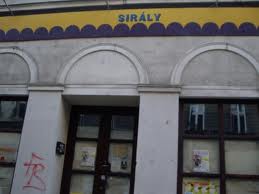A Soviet Grenade Can Still Intervene in Local Conflicts of Budapest
Original publication: The CEU Weekly, Issue 31, Mrch 27, 2013
Sirály Club (Király utca 50.) has become one of the meeting
points of student protestors involved in the recent series of HaHa demonstrations, especially in the
occupation of Fidesz’ Party Center by students. The club is rented by Marom Cultural Association that
organizes alternative cultural events, among others offers modern ways of
celebrating traditional Jewish holidays due to its mission involving the spread
of Jewish culture, support of civilian initiatives and fight against discrimination
of socially disadvantaged people. Marom did not by chance choose Sirály that is
in the heart of the old Jewish district. And Sirály is not by chance a meeting
point for young people (Jews and non Jews) who oppose the current political
leadership.
 On March 22 the owner of Sirály, the capital’s Lord Mayor’s Office suddenly declared to
break the contract with Marom and
demanded the association’s members to empty the club. According to the
justification Marom conducted commercial activity in Sirály without permission.
According to Marom they collected only donations in the club, therefore the
association did not empty the club. On the contrary, 80 activists remained in
Sirály and resisted the security guards who were sent there to force them leave
in the morning of March 23. The police claimed not to be able to intervene
since both the young activists and the security guards are legitimately there.
On March 22 the owner of Sirály, the capital’s Lord Mayor’s Office suddenly declared to
break the contract with Marom and
demanded the association’s members to empty the club. According to the
justification Marom conducted commercial activity in Sirály without permission.
According to Marom they collected only donations in the club, therefore the
association did not empty the club. On the contrary, 80 activists remained in
Sirály and resisted the security guards who were sent there to force them leave
in the morning of March 23. The police claimed not to be able to intervene
since both the young activists and the security guards are legitimately there.
And here comes the Soviet WW II grenade in the story which
was found in the afternoon of March 23 in a house of Király utca, therefore all
the people from the neighboring buildings, including Sirály were evacuated.
Meanwhile also the Jewish Community intervened in the Sirály-affair by asking
the lord mayor to allow Marom to continue its activity in Sirály at least until
April 3, the end of Pesach in this year, since a plenty of events connected to
Pesach are supposed to take place in Sirály this week.
Ágnes Kelemen, Hungary,
Nationalism Studies

Megjegyzések
Megjegyzés küldése